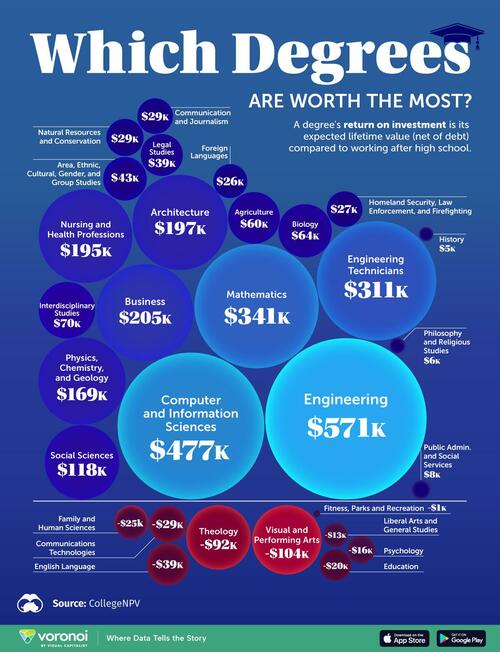
Career prospects, and especially expected lifetime salaries, can be a strong motivator or deterrent in pursuing certain college degrees.
Not all degrees guarantee higher lifetime earnings compared to entering the workforce after high school without a degree - as some degrees may end up costing more than their financial benefits.
This graphic, via Visual Capitalist's Kayla Zhu, shows the average return on investment of a degree in the U.S., based on analysis from CollegeNPV of data from the U.S. Department of Education and Bureau of Labor Statistics.
The return on investment of a degree is the expected lifetime value of the degree (net of debt) compared to entering the workforce after high school.
STEM Degrees Have The Best Bang For Their Buck
Below, we show the average return on investment of various degrees in the U.S.
| Field of Study | Average return on investment |
|---|---|
| Engineering | $570,616 |
| Computer and Information Sciences | $477,229 |
| Mathematics | $340,875 |
| Engineering Technicians | $311,141 |
| Business | $205,191 |
| Architecture | $196,711 |
| Nursing and Health Professions | $194,756 |
| Physics, Chemistry and Geology | $168,822 |
| Social Sciences | $118,454 |
| Interdisciplinary Studies | $69,656 |
| Biology | $63,913 |
| Agriculture | $59,556 |
| Area, Ethnic, Cultural, Gender and Group Studies | $42,959 |
| Legal Studies | $38,999 |
| Natural Resources and Conservation | $28,985 |
| Communication and Journalism | $28,654 |
| Homeland Security, Law Enforcement and Firefighting | $27,284 |
| Foreign Languages | $25,750 |
| Public Administration and Social Services | $7,787 |
| Philosophy and Religious Studies | $6,011 |
| History | $4,938 |
| Fitness, Parks and Recreation | -$1,078 |
| Liberal Arts and General Studies | -$13,337 |
| Psychology | -$15,644 |
| Education | -$20,075 |
| Family and Human Sciences | -$24,540 |
| Communications Technologies | -$28,911 |
| English Language | -$39,057 |
| Theology | -$91,749 |
| Visual and Performing Arts | -$104,015 |
Engineering, computer and information sciences, mathematics, and engineering technician degrees are the most valuable degrees in the U.S. when looking at expected lifetime income minus debt compared to working right after high school without a degree.
As for specific programs, Harvard University’s computer science degree ranks first for ROI, according to CollegeNPV.
Graduates of this program can expect an ROI of over $4 million in their lifetime, with $256,539 in median income and $14,000 in median debt.
On the other end, humanities degrees like visual and performing arts, theology, and English are among the least valuable degrees when looking at lifetime earnings.
With a negative ROI of about $39,000, English language programs have also experienced the greatest decrease in graduates, with 32% fewer students completing these programs compared to 10 years prior.
To learn more about some of the top universities in the U.S., check out this graphic that shows which universities produce the most startup founders.
Career prospects, and especially expected lifetime salaries, can be a strong motivator or deterrent in pursuing certain college degrees.
Not all degrees guarantee higher lifetime earnings compared to entering the workforce after high school without a degree – as some degrees may end up costing more than their financial benefits.
This graphic, via Visual Capitalist’s Kayla Zhu, shows the average return on investment of a degree in the U.S., based on analysis from CollegeNPV of data from the U.S. Department of Education and Bureau of Labor Statistics.
The return on investment of a degree is the expected lifetime value of the degree (net of debt) compared to entering the workforce after high school.
STEM Degrees Have The Best Bang For Their Buck
Below, we show the average return on investment of various degrees in the U.S.
| Field of Study | Average return on investment |
|---|---|
| Engineering | $570,616 |
| Computer and Information Sciences | $477,229 |
| Mathematics | $340,875 |
| Engineering Technicians | $311,141 |
| Business | $205,191 |
| Architecture | $196,711 |
| Nursing and Health Professions | $194,756 |
| Physics, Chemistry and Geology | $168,822 |
| Social Sciences | $118,454 |
| Interdisciplinary Studies | $69,656 |
| Biology | $63,913 |
| Agriculture | $59,556 |
| Area, Ethnic, Cultural, Gender and Group Studies | $42,959 |
| Legal Studies | $38,999 |
| Natural Resources and Conservation | $28,985 |
| Communication and Journalism | $28,654 |
| Homeland Security, Law Enforcement and Firefighting | $27,284 |
| Foreign Languages | $25,750 |
| Public Administration and Social Services | $7,787 |
| Philosophy and Religious Studies | $6,011 |
| History | $4,938 |
| Fitness, Parks and Recreation | -$1,078 |
| Liberal Arts and General Studies | -$13,337 |
| Psychology | -$15,644 |
| Education | -$20,075 |
| Family and Human Sciences | -$24,540 |
| Communications Technologies | -$28,911 |
| English Language | -$39,057 |
| Theology | -$91,749 |
| Visual and Performing Arts | -$104,015 |
Engineering, computer and information sciences, mathematics, and engineering technician degrees are the most valuable degrees in the U.S. when looking at expected lifetime income minus debt compared to working right after high school without a degree.
As for specific programs, Harvard University’s computer science degree ranks first for ROI, according to CollegeNPV.
Graduates of this program can expect an ROI of over $4 million in their lifetime, with $256,539 in median income and $14,000 in median debt.
On the other end, humanities degrees like visual and performing arts, theology, and English are among the least valuable degrees when looking at lifetime earnings.
With a negative ROI of about $39,000, English language programs have also experienced the greatest decrease in graduates, with 32% fewer students completing these programs compared to 10 years prior.
To learn more about some of the top universities in the U.S., check out this graphic that shows which universities produce the most startup founders.
Loading…





